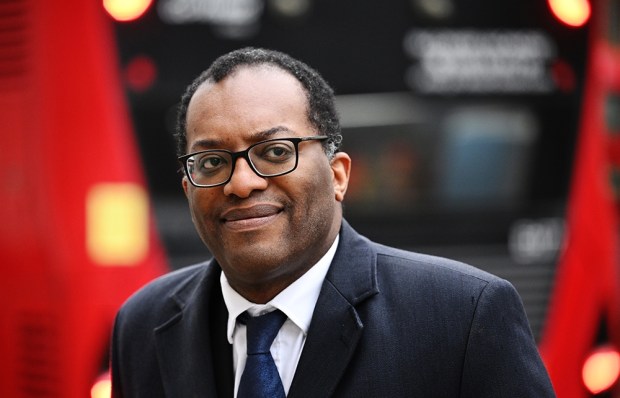‘This Article shall not apply with respect to financial services.’ That’s what it says on page 92 of the EU-UK Trade Co-operation Agreement, and my search engine has found nothing else in the monster document offering any comfort to the sector, which contributes £130 billion to the UK economy and provides more than a million jobs. That’s in marked contrast to fishing — £1.4 billion, 24,000 jobs — which gets a compromise settlement (pages 919-925, if you’re keen) accounting for every last haddock, hake and horse mackerel. No great surprise in a Brexit process in which political symbolism trumped economic sense at every turn: but does it mean our bankers have been abandoned, without passports or Portaloos, on some bleak financial equivalent of Manston Airport? If so, why haven’t they raised more protest?
Despite reassurances from Rishi Sunak, the City’s position looks substantially weaker than it did before. To be fair, financial services were never intended to be covered in this agreement; but what we know so far is that previous ‘passporting’ rights have been forfeited and UK firms’ access to EU markets now depends on compliance with the different requirements of each member state, under ‘equivalence’ rulings that can be withdrawn at 30 days’ notice.
The Chancellor and the Bank of England might have retorted by making it tougher for EU banks to remain full players in London: pushing them out of clearing services, or reducing the acceptability of EU government bonds as security for short-term borrowing at the Bank. Instead, our side seems to have rolled over — perhaps under pressure from US firms threatening to leave London en masse rather than merely move deal-booking centres to Frankfurt or Dublin.
In short, while every effort went into cobbling a deal on trade in goods (always the Brussels priority), financial service providers, who generate so much UK wealth, have been left to fight for their own futures. They’re an opportunist breed whose ultra-flexible product — money — slips through nets far easier than fish, so many will no doubt continue to prosper. But a further ‘memorandum of understanding’ on EU-UK co-operation in financial services is due in March and I hope we hear much more clamour from the City before then.
A new global role?
A key line in Sunak’s ‘reassurance’ statement was about ‘examining how we can make the City of London the most attractive place to list new companies anywhere in the world’. Right now, that’s a tall order. The FTSE100 index, weighed down by old–economy stocks, fell 14 per cent last year, while New York’s S&P500 rose 16 per cent and Nasdaq, the tech-dominated US exchange, gained 40 per cent. Chinese markets did well too. Even Europe’s, in aggregate, beat ours.
Why, if you had a choice, would you list on an exchange that’s likely to generate a lower value for your shares than elsewhere? These days it’s Nasdaq where the UK’s best hi-tech companies aspire to list, because it offers higher valuations and higher profile, and attracts support from specialist investment funds. Meanwhile, the roll-call of new listings on the London Stock Exchange is an exotic ragbag in which oil, gas and mining still tend to predominate. And one Brexit effect is that trade in shares of blue-chip European companies that might once have thought a London listing de rigueur has largely migrated to continental exchanges.
Yes, it will be wonderful if London finds a new role over the next decade as the world leader in capital-raising for advanced bioscience and green energy, just as it once financed the global building of railways. I look forward to hearing from the Chancellor how he proposes to make that happen.
Boaty McBailout
‘Always remember you’re related to Cammell Laird,’ my grandmother used to say — and it’s true I bear some resemblance to portraits of my distant cousin Charles Cammell (1810-79), a Sheffield steel man whose descendants bought the Laird shipyard in Birkenhead. So I’m pleased to learn that the family firm, as I like to think of it, is still in business — but sorry to see it was almost bankrupted by £37 million of cost overruns on a contract to build Sir David Attenborough, the polar research ship the public wanted to name ‘Boaty McBoatface’. Investors led by the canny Manchester-based Peel Group stepped in to keep the enterprise afloat; if they’d asked, I’d have been proud to join them.
Peerless restaurateur
In the grimmest of times, let’s count our blessings. For some, that will include unexpected savings, in which case please spend as freely as you can with local businesses that deserve to survive. But where normal spending is forcibly suspended — on winter travel, for example — I recommend the therapy of vicarious pleasure provoked by random connection.
An email from a club I can’t visit tells me I’m now welcome as a reciprocal guest at the Bahia yacht club in Salvador, Brazil, which looks fabulous. A dip into my matchbox collection transports me to Hong Kong’s naughty New Tonnochy Night Club — which I discover has been reinvented as a karaoke complex. A new year tidying of the sock drawer produces a card from Chez Kiki (‘spécialités Savoyardes’) in the closed French ski resort of Méribel — and makes me think of my favourite lunch spot in all of Europe: Restaurant Le Bel Air, high on the slopes of neighbouring Courchevel.
But I’m sad to learn that Bel Air’s peerless patronChristophe Gormier died in July, not of Covid but of sudden cancer. If he had ever retired he could have had a second career as a management guru, teaching chief executives about team motivation, just-in-time logistics and, above all, building customer loyalty. Readers who recall his film-star smile will join me, I’m sure, in raising a post-lunch grappa to his memory.
Got something to add? Join the discussion and comment below.
Get 10 issues for just $10
Subscribe to The Spectator Australia today for the next 10 magazine issues, plus full online access, for just $10.
You might disagree with half of it, but you’ll enjoy reading all of it. Try your first month for free, then just $2 a week for the remainder of your first year.















Comments
Don't miss out
Join the conversation with other Spectator Australia readers. Subscribe to leave a comment.
SUBSCRIBEAlready a subscriber? Log in